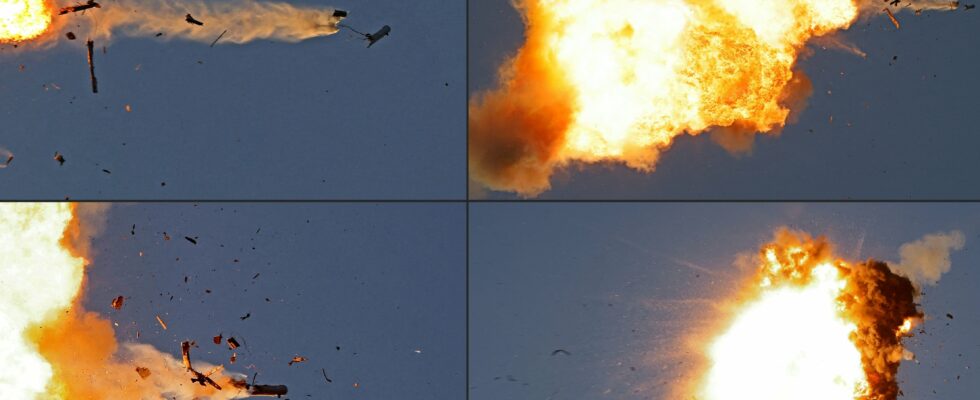Nearly 320 rockets and dozens of drones were launched by Lebanese Hezbollah on Israel in the early morning of Sunday, August 25, damaging eleven military sites in the north of the country and on the occupied Golan Heights. This massive offensive had been promised by the Shiite movement – supported by Iran – in retaliation for the death of a senior military leader killed in an Israeli strike on Beirut on July 30. If the attack is “over” for today, according to Hezbollah, it could herald a second, more in-depth operation, believes David Rigoulet-Roze, a researcher at the French Institute for Strategic Analysis (IFAS) and the Institute for International and Strategic Relations (Iris).
A hypothesis that is impossible, for the moment, to confirm. “We are still in what is called ‘the fog of war'”, warns the researcher. A statement by the leader of the Lebanese Shiite movement nevertheless suggests that this lightning attack does not mark the end of the offensive on Israeli territory. “This large-scale strike was presented by the Secretary General of Hezbollah, Hassan Nasrallah, as intended ‘to facilitate the passage of deep attack drones’. He considers that this first phase has been successfully completed”, notes the specialist in the region.
Could it have been only the preparatory element for a more extensive and more destructive offensive? “According to Israeli security sources, there may have been behind this first attack the idea of targeting Israeli territory, and in particular Tel Aviv, during a second attack,” explains David Rigoulet-Roze. It was these predictions that triggered, this Sunday morning, in the wake of the Lebanese attack, the extension of the state of emergency for 48 hours to the rest of Israeli territory, beyond the Galilee, the Upper Galilee and the Golan. The Minister of Defense, Yoav Gallant, thus said he was “convinced that there is a strong probability that an attack will be carried out against the civilian population in other areas of the country as well.”
Israel’s preemptive operation
For the researcher, this also explains the preventive operation launched by Israel, a few hours before the rocket strikes, after detecting signs of preparation for an attack by Hezbollah. “A hundred planes were launched in about forty launch zones to neutralize some 6,000 Hezbollah rockets and drones,” he specifies. An operation “probably made possible by American surveillance capabilities, which could have helped Israel justify launching their preventive strike on southern Lebanon, in particular by providing them with satellite information” allowing them to detect the activation of Hezbollah rockets, suggests David Rigoulet-Roze.
What can we expect in the coming days? And what would the targets be if Hezbollah were to launch a second phase? “For the moment, we are uncertain, and we must be very careful. But we cannot rule out that strategic targets will be targeted soon,” explains the specialist. Tel Aviv’s Ben Gurion Airport had suspended its flights and closed its doors for several hours on the night of Saturday to Sunday, in anticipation of the Lebanese offensive, before reopening at 7 a.m., once it was assured that the strikes had ended. “We can also think of certain potential targets in Tel Aviv, such as the neighborhood that houses the Mossad headquarters, Unit 8200 (the secret cyber warfare unit) and the Kyria, the headquarters of the Israeli army,” explains David Rigoulet-Roze.
“For Israel, this situation in the north of the country is not sustainable”
The timing of the continuation of the exchange of strikes remains unknown. “According to statements from both sides, the “first phase” of Hezbollah’s offensive is over today,” the researcher repeats. “We find the same calibrated language on the Israeli side, for which there are no plans to extend the attacks to southern Lebanon in the immediate future,” he adds.
Faced with this uncertainty that hangs over the entire region, the language of Israel’s American ally is intended to be reassuring. During an exchange between Yoav Gallant and his US counterpart Lloyd Austin, the two parties once again stressed the importance of “avoiding a regional escalation”, “which remains the obsession of the United States”, notes the researcher.
“Israel has also reiterated the need to allow residents of the north of the country to return to their homes once the security situation has been restored,” he continued. Currently, nearly 10% of the territory in the north of the country is no longer safely habitable. The situation is similar on the Lebanese side. “Several tens of thousands of Israeli residents of the Galilee have been evacuated and placed in hotels in the country,” he pointed out. One thing is certain, according to him: “For the Israeli authorities, this situation in the north of the country is not sustainable in the long term.”
.
